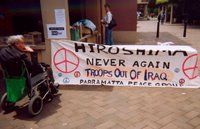 What is Peace?
What is Peace?Peace is not just the absence of war, but the presence of real justice
Martin Luther King Jr.What does Peace mean?So what does Peace mean in this savage, corporatized, militarized world? What does it mean in a world where an entrenched system of appropriation has created a situation in which poor countries which have been plundered by colonizing regimes for centuries are steeped in debt to the very same countries that plundered them, and have to repay that debt at the rate of 382 billion dollars a year? What does peace mean in a world in which the combined wealth of the world's 587 billionaires exceeds the combined gross domestic product of the world's 135 poorest countries? Or when rich countries that pay farm subsidies of a billion dollars a day, try and force poor countries to drop their subsidies? What does peace mean to people in occupied Iraq, Palestine, Kashmir, Tibet and Chechnya? Or to the aboriginal people of Australia? Or the Ogoni of Nigeria? Or the Kurds in Turkey? Or the Dalits and Adivasis of India? What does peace mean to non-muslims in Islamic countries, or to women in Iran, Saudi Arabia and Afghanistan? What does it mean to the millions who are being uprooted from their lands by dams and development projects? What does peace mean to the poor who are being actively robbed of their resources and for whom everyday life is a grim battle for water, shelter, survival and, above all, some semblance of dignity? For them, peace is war.
We know very well who benefits from war in the age of Empire. But we must also ask ourselves honestly who benefits from peace in the age of Empire? War mongering is criminal. But talking of peace without talking of justice could easily become advocacy for a kind of capitulation. And talking of justice without unmasking the institutions and the systems that perpetrate injustice, is beyond hypocritical.
It's easy to blame the poor for being poor. It's easy to believe that the world is being caught up in an escalating spiral of terrorism and war. That's what allows the American President to say "You're either with us or with the terrorists." But we know that that's a spurious choice. We know that terrorism is only the privatization of war. That terrorists are the free marketers of war. They believe that the legitimate use of violence is not the sole prerogative of the State.
It is mendacious to make moral distinction between the unspeakable brutality of terrorism and the indiscriminate carnage of war and occupation. Both kinds of violence are unacceptable. We cannot support one and condemn the other.
The real tragedy is that most people in the world are trapped between the horror of a putative peace and the terror of war. Those are the two sheer cliffs we're hemmed in by. The question is: How do we climb out of this crevasse?
For those who are materially well-off, but morally uncomfortable, the first question you must ask yourself is do you really want to climb out of it? How far are you prepared to go? Has the crevasse become too comfortable?
If you really want to climb out, there's good news and bad news.
The good news is that the advance party began the climb some time ago. They're already half way up. Thousands of activists across the world have been hard at work preparing footholds and securing the ropes to make it easier for the rest of us. There isn't only one path up. There are hundreds of ways of doing it. There are hundreds of battles being fought around the world that need your skills, your minds, your resources. No battle is irrelevant. No victory is too small.
The bad news is that colorful demonstrations, weekend marches and annual trips to the World Social Forum are not enough. There have to be targeted acts of real civil disobedience with real consequences. Maybe we can't flip a switch and conjure up a revolution. But there are several things we could do. For example, you could make a list of those corporations who have profited from the invasion of Iraq and have offices here in Australia. You could name them, boycott them, occupy their offices and force them out of business. If it can happen in Bolivia, it can happen in India. It can happen in Australia. Why not?
That's only a small suggestion. But remember that if the struggle were to resort to violence, it will lose vision, beauty and imagination. Most dangerous of all, it will marginalize and eventually victimize women. And a political struggle that does not have women at the heart of it, above it, below it, and within it is no struggle at all.
The point is that the battle must be joined.
As the wonderful American historian Howard Zinn put it: "You Can't Be Neutral on a Moving Train."
Arundhati RoyFragment of her Speech on accepting the Sydney Peace Prize - November 07, 2004

